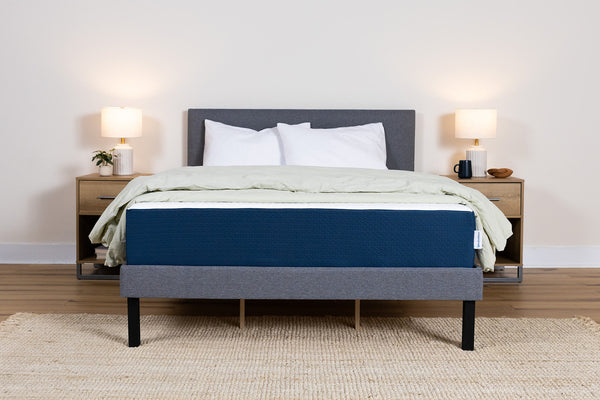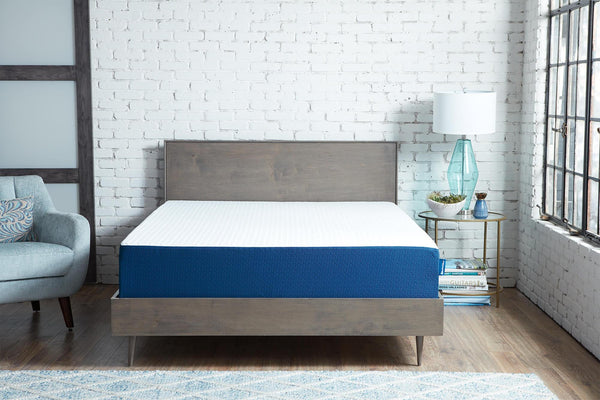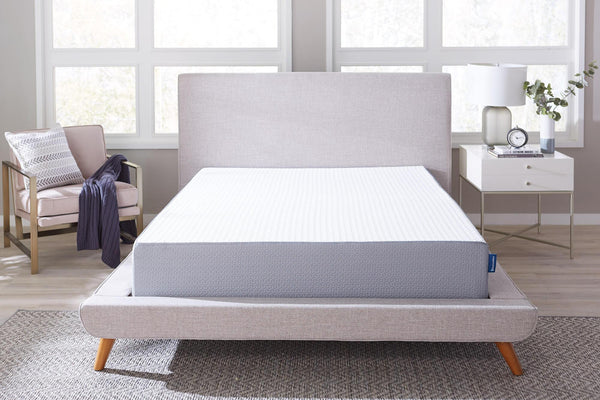Sleep Environment Tips for Winter

Curating a healthy sleep environment for each season goes beyond just the quality of your mattress or sleep accessories. How you set up your sleep space and what you do during the daytime and evening hours play a significant role in how well you sleep. This guide details exactly what you should consider going into the winter months to maintain a healthy sleep environment that promotes restfulness and induces sleep.
Contents
Don't Skip Out on Exercising
We already know that regular exercise can be beneficial for sleep. Many experts suggest that 20-30 minutes of exercise during the day is a great way to improve your quality of sleep. Although you may feel compelled to skip out on exercising during the cooler months, it is important to maintain your exercise routine to keep you falling asleep consistently and waking up less throughout the night. However, try to avoid exertional exercise one to two hours before bed. If you workout too late in the evening, you may actually make falling asleep more difficult by increasing your heart rate.
Don't Touch That Thermostat
No doubt that the cooler temperatures of winter will encourage you to crank up the heat and cuddle up under a mountain of blankets. As appealing as this is, a toasty sleep environment can actually have a detrimental effect on our quality of sleep. Various studies have shown that sleeping in a cool room (ideally 60-67 degrees Fahrenheit) leads to deeper, more restorative sleep. On the other hand, rooms that are too warm (75 degrees and above) can lead to sweating, tossing and turning, or other discomfort that may disrupt sleep.
Limit Your Use of Electronics in Bed
Limited exposure to blue light before bed is already important, but it is even more important during the winter. With days being shorter during winter months, the lack of daylight may throw off your body’s natural sleep-wake cycle, being that it is largely determined by the amount of light you are exposed to. As a result, your body may have an inclination to go to sleep earlier than normal, so it becomes even more important to stay off of electronic devices when you begin your bedtime routine. By maintaining your normal sleep and wake times and winding down with nighttime activities, such as reading or meditating, that don’t require the use of technology, you should get more, higher-quality sleep, than if you were to stay away with your TV or tablet.
Keep Your Blinds Open
Even though there is less daytime during the winter, it is still so important to soak up as much natural light as you can throughout the day. Sunlight triggers a suppression of melatonin, which keeps us feeling energized during daytime hours. However, since the sun sets earlier, our melatonin levels start to rise prematurely. We may start to feel more tired, sluggish and that sustained daytime energy we experience during the Spring and Summer months becomes a thing of the past if we don’t actively expose ourselves to natural light. We suggest sleeping with your blinds open during the colder months, so you can be exposed to natural light as soon as the sun rises. You may even want to consider using a sunlight alarm clock, which gradually wakes you up by mimicking a sunrise.
Consider Using a Humidifier
Winter air means drier air, which triggers dry, itchy skin and can lead to irritation of the nose and throat. The combination of this dryness and irritation can make it harder to fall or stay asleep. Running a humidifier in the bedroom during the winter can add moisture to the air, minimizing the dryness or itchiness we generally experience once the heat kicks on. Aromatherapy diffusers are a great alternative, which disperse essential oils and small water droplets throughout the room.
Keep Stress at Bay
When your stress levels are high, you may find it more difficult to fall asleep. The winter itself can be stressful with the hustle and bustle of the holiday season, going back to work after celebrating the New Year, and keeping up with your own resolutions. Winter can also be a catalyst for seasonal depression. Taking all of this in consideration, you should strive to keep your bedroom a stress-free environment. This means keeping schoolwork or office work out of the bedroom so that you don’t start associating your bedroom with stressful, wakeful-ness promoting activities. This association can lead to unnecessary stress or anxiety, making it more difficult to get the sleep you need. Your bed should be reserved for sleep and intimacy.
Switch Out Your Bedsheets
When you adjust your sleep environment for the winter, don’t forget to swap your bedding. The bedding you use for the summer should be different from what you use during the winter. To maintain a comfortable sleep temperature during cold weather, you may want to use multiple layers of bedding. A natural fiber sheet, like our Tencel™ sheet set, a light blanket, and a comforter should provide enough warmth to allow your body temperature to adjust as needed. By updating your sleep setup, you may be less likely to crank up the heat, too.
We rely on our bedrooms to bring us calmness and comfort. Make sure you set yourself up with a quality mattress and a healthy, happy sleep space to carry the comfort from season to season.


